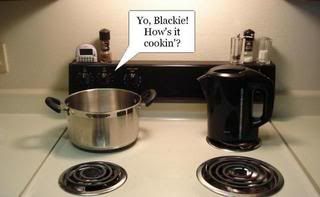Kitchen cookware doesn't talk.... uh, hellooo.
... yeah, but is he black?
How am I supposed to know what that means? So I ask. "I'm sorry, I don't know what that means." Everyone always looks at me and asks, "wait, where are you from?"
So it was explained to me, "the pot is black, and it's saying the kettle is black. But they're both black. Get it?"
What? No.
My thoughts:
Where I come from both the pot and kettle are more of a grey metal color... and they don't really talk much. Except the kettle, and it whistles a bit. Actually we have one of those electric kettles you plug into the electrical outlet and it dings when the water is boiled but we used to have a whistler. But I'll play along with this notion of old-fashioned kettles. So I'll imagine a cast-iron kettle and a cast-iron pot. Eewwwwwww who would want to cook anything in that? There'd be metal shavings all in the food!
After I casted a puzzled look, my friend (okay, it was Justin again) shouted exasperatingly "Hypocrite! It means you're a hypocrite!"
"Ohhh.... like the whole spec/plank in your eye?"
Now it was Justin who returned the puzzled look.
I continued, "yea... you know, before you mention the spec in your neighbor's eye, remove the plank from your own... No? Well...I'd rather say, 'Before I tell you this, I need to take the plank outta my eye...' It'd probably have a more comical or confusing effect than 'I'M A HYPOCRITE!'"
Justin looked at me in disbelief. "That's why you say 'That's like the pot calling the kettle black'..."
"I suppose..."
Spear's Definition:
The pot is calling the kettle black or That's the pot calling the kettle black
Prov. You should not criticize someone for a fault that you have too. (Not polite to say about the person you are addressing.)
Bill told Barbara she was sloppy, but Bill never cleans up after himself, either. That's the pot calling the kettle black.
My sister says I dress funny, but if you've seen some of the clothes she wears, you know it's a case of the pot calling the kettle black.
Okay, okay. So it had been explained. It had soaked in. I could put it into use in my everyday vocabulary.
That's the Pot Calling the Kettle Black
My Score Card for this idiom:
Able to be understood initially?: No
Able to be understood once explained?: Yes
Next problem:
Which one is the name-caller?
Is the kettle calling the pot black?
Kettles tend to be noisier.
Wait, no, it's the pot.
After encountering this dilemma a few times, I compromised with,
"That's the pot or the kettle calling the other one black."
People know what I'm saying even though they cock their head to one side as if to have the sentence trickle down in between the ears to have it come out translated on the other side.
Meh, it still works for me.
Awkwardly yours,
an under-read American

2 comments:
laughed when I read this post...actually, the pot is calling the kettle black comes from a time when the pot WAS black (cast iron) and the kettle was silver. When the pot looks (figuratively) at the kettle, he sees his own reflection, but thinks (again figuratively) that he is seeing a black spot on the silver kettle. The tells the kettle he has a black spot...not realizing he IS the black spot!
Loving the langauge..
"The pot calling the kettle black" is a proverbial idiom that may be of Spanish origin of which English versions began to appear in the first half of the 17th century. The idiom is glossed in the original sources as being used of a person who is guilty of the very thing of which they accuse another and is thus an example of psychological projection.
The earliest appearance of the idiom is in Thomas Shelton's 1620 translation of the Spanish novel Don Quixote. The protagonist is growing increasingly restive under the criticisms of his servant Sancho Panza, of which one is that "You are like what is said that the frying-pan said to the kettle, 'Avant, black-browes'." The Spanish text at this point reads: Dijo la sartén a la caldera, Quítate allá ojinegra (Said the pan to the pot, get out of there black-eyes). It is identified as a proverb (refrán) in the text, functioning as a retort to the person who criticises another of the same defect that he plainly has. Among several variations, the one where the pan addresses the pot as culinegra (black-arse) makes clear that they are dirtied in common by contact with the cooking fire.
Read more at theidioms.com.
Post a Comment